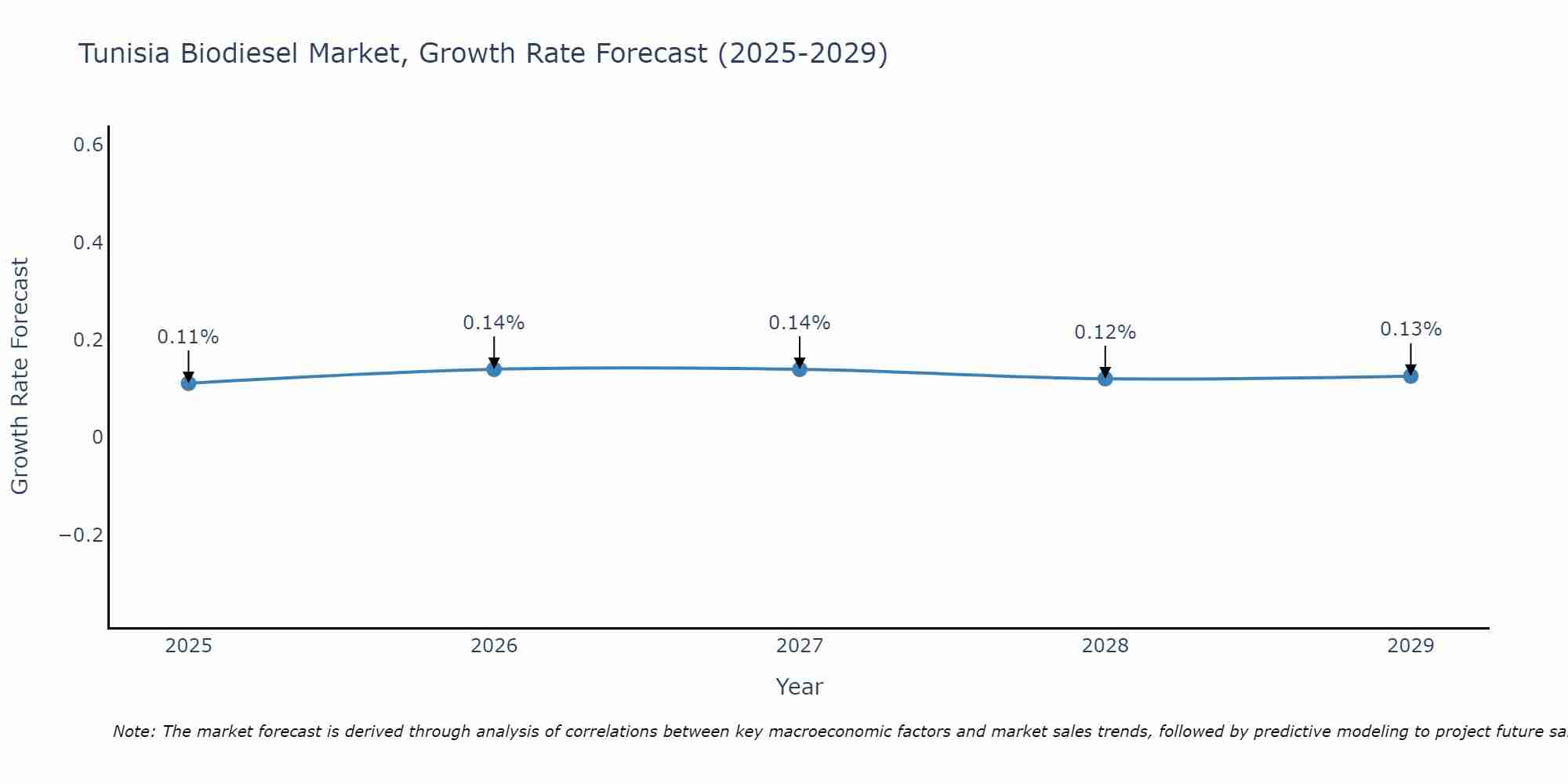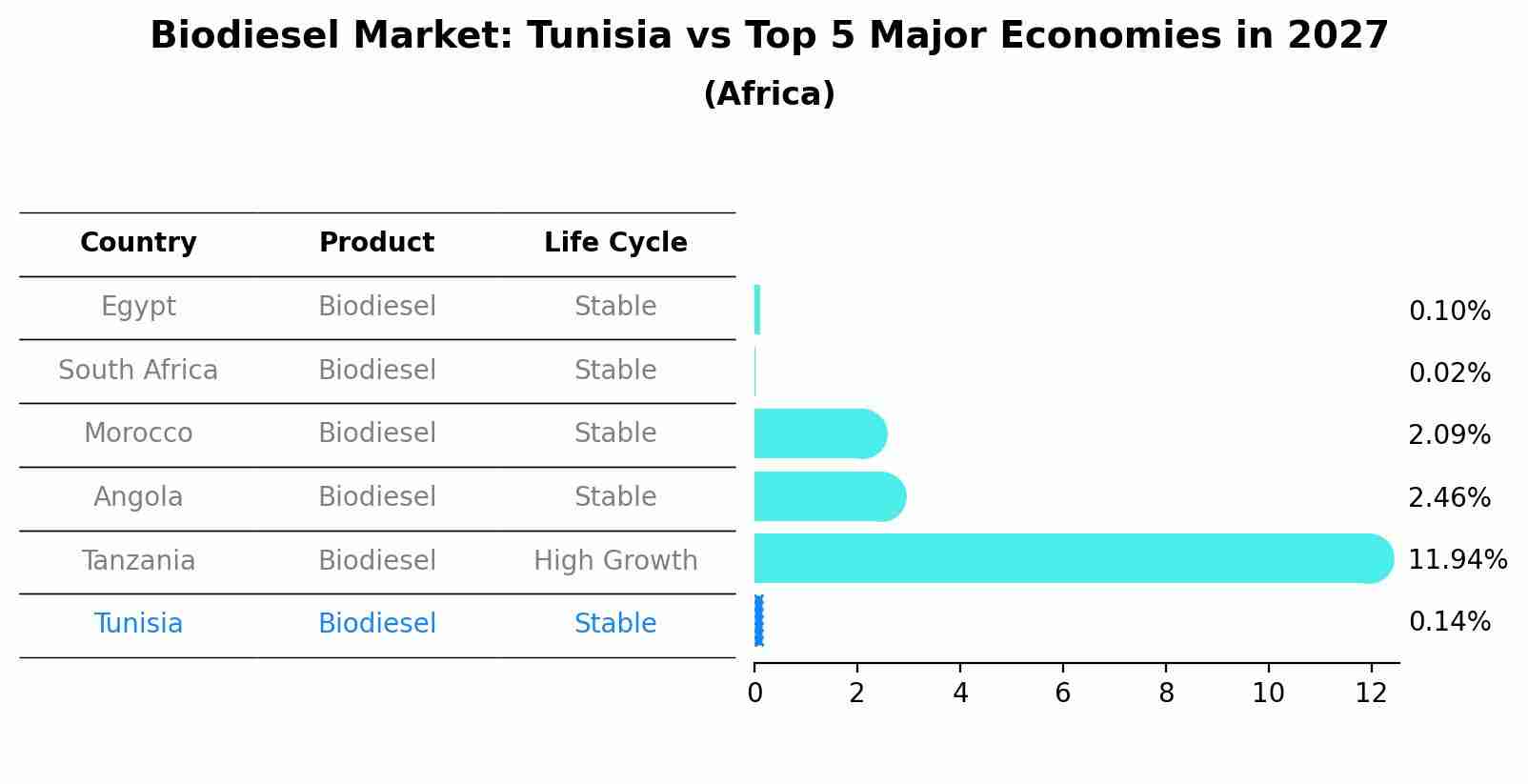Tunisia Biodiesel Market (2025-2031) | Companies, Industry, Trends, Forecast, Revenue, Value, Share, Growth, Outlook, Analysis & Size
| Product Code: ETC007574 | Publication Date: Sep 2020 | Updated Date: Jun 2025 | Product Type: Report | |
| Publisher: 6Wresearch | Author: Sumit Sagar | No. of Pages: 70 | No. of Figures: 35 | No. of Tables: 5 |
Tunisia Biodiesel Market Size Growth Rate
The Tunisia Biodiesel Market is projected to witness mixed growth rate patterns during 2025 to 2029. Growth accelerates to 0.14% in 2026, following an initial rate of 0.11%, before easing to 0.13% at the end of the period.

Biodiesel Market: Tunisia vs Top 5 Major Economies in 2027 (Africa)
In the Africa region, the Biodiesel market in Tunisia is projected to expand at a stable growth rate of 0.14% by 2027. The largest economy is Egypt, followed by South Africa, Morocco, Angola and Tanzania.

Tunisia Biodiesel Market Overview
The Tunisia biodiesel market is experiencing steady growth driven by increasing awareness of environmental issues and government initiatives promoting renewable energy sources. The market is primarily driven by the transportation sector, with biodiesel being seen as a cleaner alternative to traditional fossil fuels. Key players in the market include local biodiesel producers as well as international companies looking to capitalize on the growing demand for sustainable energy solutions. Despite facing challenges such as fluctuating feedstock prices and limited infrastructure, the Tunisia biodiesel market is expected to continue its upward trajectory in the coming years as the country strives to reduce its reliance on imported fossil fuels and achieve its renewable energy targets.
Tunisia Biodiesel Market Trends
The Tunisia Biodiesel Market is experiencing a growing trend towards sustainable and renewable energy sources, driven by increasing environmental concerns and government initiatives to reduce dependence on fossil fuels. Companies in the market are focusing on expanding production capacity and enhancing the efficiency of biodiesel production processes. Additionally, there is a rising demand for biodiesel as a cleaner alternative to traditional diesel fuel, particularly in the transportation sector. The market is also witnessing a shift towards advanced technologies such as second-generation biodiesel production methods to improve the overall sustainability and competitiveness of the industry. Overall, the Tunisia Biodiesel Market is poised for steady growth as the country aims to achieve its renewable energy targets and reduce greenhouse gas emissions.
Tunisia Biodiesel Market Challenges
In the Tunisia Biodiesel Market, several challenges are faced including limited availability of feedstock such as vegetable oils, stringent regulations and high taxes on imported feedstock, fluctuating global oil prices impacting the competitiveness of biodiesel, lack of awareness and acceptance among consumers, inadequate infrastructure for biodiesel production and distribution, and limited government support and incentives for the biodiesel industry. Additionally, the lack of research and development efforts in the sector, as well as the high initial investment costs associated with setting up biodiesel production facilities, further hinder the growth of the market in Tunisia. Overcoming these challenges will require collaborative efforts from government, industry stakeholders, and investors to develop sustainable solutions and promote the adoption of biodiesel as a viable alternative energy source in the country.
Tunisia Biodiesel Market Investment Opportunities
Investment opportunities in the Tunisia biodiesel market are promising due to the country`s efforts to reduce dependence on fossil fuels and promote sustainable energy sources. Key opportunities include investing in biodiesel production facilities using locally sourced feedstocks such as olive oil, sunflower oil, and animal fats. There is also potential for partnerships with agriculture sector stakeholders to secure a consistent supply of feedstock. Additionally, investing in research and development for improving biodiesel production processes and technologies can enhance competitiveness in the market. With increasing government support through policies and incentives to promote biofuels, investing in the Tunisia biodiesel market presents a sustainable and environmentally friendly opportunity for investors looking to capitalize on the growing demand for renewable energy sources.
Tunisia Biodiesel Market Government Policy
The Tunisian government has implemented several policies to support the development of the biodiesel market in the country. These policies include incentives such as tax breaks and subsidies for biodiesel producers, as well as mandates for blending biodiesel with traditional diesel fuels. Additionally, the government has established regulations to ensure the sustainability of biodiesel production, including guidelines for feedstock sourcing and production processes. The aim of these policies is to reduce dependence on imported fossil fuels, promote environmental sustainability, and boost the agricultural sector by providing new market opportunities for farmers. Overall, the government`s support for the biodiesel market in Tunisia is part of a broader strategy to achieve energy security and reduce greenhouse gas emissions.
Tunisia Biodiesel Market Future Outlook
The future outlook for the Tunisia Biodiesel Market appears promising due to several factors. Government initiatives promoting renewable energy sources, increasing awareness about environmental sustainability, and the rising demand for cleaner fuel alternatives are driving the growth of the biodiesel market in Tunisia. Additionally, the country`s favorable climate conditions for growing feedstock crops such as sunflower and rapeseed further support the expansion of the biodiesel industry. With a focus on reducing dependence on imported fossil fuels and achieving energy security, Tunisia is likely to witness continued investment in biodiesel production infrastructure and research and development efforts. Overall, the Tunisia Biodiesel Market is expected to experience steady growth in the coming years, presenting opportunities for industry players and investors alike.
Key Highlights of the Report:
- Tunisia Biodiesel Market Outlook
- Market Size of Tunisia Biodiesel Market, 2024
- Forecast of Tunisia Biodiesel Market, 2026
- Historical Data and Forecast of Tunisia Biodiesel Revenues & Volume for the Period 2021 - 2031
- Tunisia Biodiesel Market Trend Evolution
- Tunisia Biodiesel Market Drivers and Challenges
- Tunisia Biodiesel Price Trends
- Tunisia Biodiesel Porter's Five Forces
- Tunisia Biodiesel Industry Life Cycle
- Historical Data and Forecast of Tunisia Biodiesel Market Revenues & Volume By Feedstock for the Period 2021 - 2031
- Historical Data and Forecast of Tunisia Biodiesel Market Revenues & Volume By Vegetable Oils for the Period 2021 - 2031
- Historical Data and Forecast of Tunisia Biodiesel Market Revenues & Volume By Animal Fats for the Period 2021 - 2031
- Historical Data and Forecast of Tunisia Biodiesel Market Revenues & Volume By Applications for the Period 2021 - 2031
- Historical Data and Forecast of Tunisia Biodiesel Market Revenues & Volume By Power Generation for the Period 2021 - 2031
- Historical Data and Forecast of Tunisia Biodiesel Market Revenues & Volume By Fuel for the Period 2021 - 2031
- Historical Data and Forecast of Tunisia Biodiesel Market Revenues & Volume By Others for the Period 2021 - 2031
- Tunisia Biodiesel Import Export Trade Statistics
- Market Opportunity Assessment By Feedstock
- Market Opportunity Assessment By Applications
- Tunisia Biodiesel Top Companies Market Share
- Tunisia Biodiesel Competitive Benchmarking By Technical and Operational Parameters
- Tunisia Biodiesel Company Profiles
- Tunisia Biodiesel Key Strategic Recommendations
Frequently Asked Questions About the Market Study (FAQs):
1 Executive Summary |
2 Introduction |
2.1 Key Highlights of the Report |
2.2 Report Description |
2.3 Market Scope & Segmentation |
2.4 Research Methodology |
2.5 Assumptions |
3 Tunisia Biodiesel Market Overview |
3.1 Tunisia Country Macro Economic Indicators |
3.2 Tunisia Biodiesel Market Revenues & Volume, 2019 & 2026F |
3.3 Tunisia Biodiesel Market - Industry Life Cycle |
3.4 Tunisia Biodiesel Market - Porter's Five Forces |
3.5 Tunisia Biodiesel Market Revenues & Volume Share, By Feedstock, 2019 & 2026F |
3.6 Tunisia Biodiesel Market Revenues & Volume Share, By Applications, 2019 & 2026F |
4 Tunisia Biodiesel Market Dynamics |
4.1 Impact Analysis |
4.2 Market Drivers |
4.3 Market Restraints |
5 Tunisia Biodiesel Market Trends |
6 Tunisia Biodiesel Market, By Types |
6.1 Tunisia Biodiesel Market, By Feedstock |
6.1.1 Overview and Analysis |
6.1.2 Tunisia Biodiesel Market Revenues & Volume, By Feedstock, 2016 - 2026F |
6.1.3 Tunisia Biodiesel Market Revenues & Volume, By Vegetable Oils, 2016 - 2026F |
6.1.4 Tunisia Biodiesel Market Revenues & Volume, By Animal Fats, 2016 - 2026F |
6.2 Tunisia Biodiesel Market, By Applications |
6.2.1 Overview and Analysis |
6.2.2 Tunisia Biodiesel Market Revenues & Volume, By Power Generation, 2016 - 2026F |
6.2.3 Tunisia Biodiesel Market Revenues & Volume, By Fuel, 2016 - 2026F |
6.2.4 Tunisia Biodiesel Market Revenues & Volume, By Others, 2016 - 2026F |
7 Tunisia Biodiesel Market Import-Export Trade Statistics |
7.1 Tunisia Biodiesel Market Export to Major Countries |
7.2 Tunisia Biodiesel Market Imports from Major Countries |
8 Tunisia Biodiesel Market Key Performance Indicators |
9 Tunisia Biodiesel Market - Opportunity Assessment |
9.1 Tunisia Biodiesel Market Opportunity Assessment, By Feedstock, 2019 & 2026F |
9.2 Tunisia Biodiesel Market Opportunity Assessment, By Applications, 2019 & 2026F |
10 Tunisia Biodiesel Market - Competitive Landscape |
10.1 Tunisia Biodiesel Market Revenue Share, By Companies, 2024 |
10.2 Tunisia Biodiesel Market Competitive Benchmarking, By Operating and Technical Parameters |
11 Company Profiles |
12 Recommendations |
13 Disclaimer |
- Single User License$ 1,995
- Department License$ 2,400
- Site License$ 3,120
- Global License$ 3,795
Search
Related Reports
- Australia IT Asset Disposal Market (2025-2031) | Strategy, Consumer Insights, Analysis, Investment Trends, Opportunities, Growth, Size, Share, Industry, Revenue, Segments, Value, Segmentation, Supply, Forecast, Restraints, Outlook, Competition, Drivers, Trends, Demand, Pricing Analysis, Competitive, Strategic Insights, Companies, Challenges
- UAE Building Thermal Insulation Market Outlook (2025-2031) | Revenue, Companies, Share, Trends, Growth, Size, Forecast, Industry, Analysis & Value
- Portugal Electronic Document Management Market (2025-2031) | Strategy, Consumer Insights, Analysis, Investment Trends, Opportunities, Growth, Size, Share, Industry, Revenue, Segments, Value, Segmentation, Supply, Forecast, Restraints, Outlook, Competition, Drivers, Trends, Demand, Pricing Analysis, Competitive, Strategic Insights, Companies, Challenges
- France Electronic Document Management Market (2025-2031) | Strategy, Consumer Insights, Analysis, Investment Trends, Opportunities, Growth, Size, Share, Industry, Revenue, Segments, Value, Segmentation, Supply, Forecast, Restraints, Outlook, Competition, Drivers, Trends, Demand, Pricing Analysis, Competitive, Strategic Insights, Companies, Challenges
- Portugal Occupational Health & Safety Services Market (2025-2031) | Strategy, Consumer Insights, Analysis, Investment Trends, Opportunities, Growth, Size, Share, Industry, Revenue, Segments, Value, Segmentation, Supply, Forecast, Restraints, Outlook, Competition, Drivers, Trends, Demand, Pricing Analysis, Competitive, Strategic Insights, Companies, Challenges
- Netherlands Occupational Health and Safety Services Market (2025-2031) | Strategy, Consumer Insights, Analysis, Investment Trends, Opportunities, Growth, Size, Share, Industry, Revenue, Segments, Value, Segmentation, Supply, Forecast, Restraints, Outlook, Competition, Drivers, Trends, Demand, Pricing Analysis, Competitive, Strategic Insights, Companies, Challenges
- Belgium and Luxembourg Facility Management Market (2025-2031) | Strategy, Consumer Insights, Analysis, Investment Trends, Opportunities, Growth, Size, Share, Industry, Revenue, Segments, Value, Segmentation, Supply, Forecast, Restraints, Outlook, Competition, Drivers, Trends, Demand, Pricing Analysis, Competitive, Strategic Insights, Companies, Challenges
- Russia Women Intimate Apparel Market (2025-2031) | Strategy, Consumer Insights, Analysis, Investment Trends, Opportunities, Growth, Size, Share, Industry, Revenue, Segments, Value, Segmentation, Supply, Forecast, Restraints, Outlook, Competition, Drivers, Trends, Demand, Pricing Analysis, Competitive, Strategic Insights, Companies, Challenges
- Africa Chocolate Market (2025-2031) | Size, Share, Trends, Growth, Revenue, Analysis, Forecast, industry & Outlook
- Global Hydroxychloroquine And Chloroquine Market (2025-2031) | Industry, Trends, Size, Outlook, Growth, Value, Companies, Revenue, Analysis, Share, Forecast
Industry Events and Analyst Meet
Our Clients
Whitepaper
- Middle East & Africa Commercial Security Market Click here to view more.
- Middle East & Africa Fire Safety Systems & Equipment Market Click here to view more.
- GCC Drone Market Click here to view more.
- Middle East Lighting Fixture Market Click here to view more.
- GCC Physical & Perimeter Security Market Click here to view more.
6WResearch In News
- Doha a strategic location for EV manufacturing hub: IPA Qatar
- Demand for luxury TVs surging in the GCC, says Samsung
- Empowering Growth: The Thriving Journey of Bangladesh’s Cable Industry
- Demand for luxury TVs surging in the GCC, says Samsung
- Video call with a traditional healer? Once unthinkable, it’s now common in South Africa
- Intelligent Buildings To Smooth GCC’s Path To Net Zero













